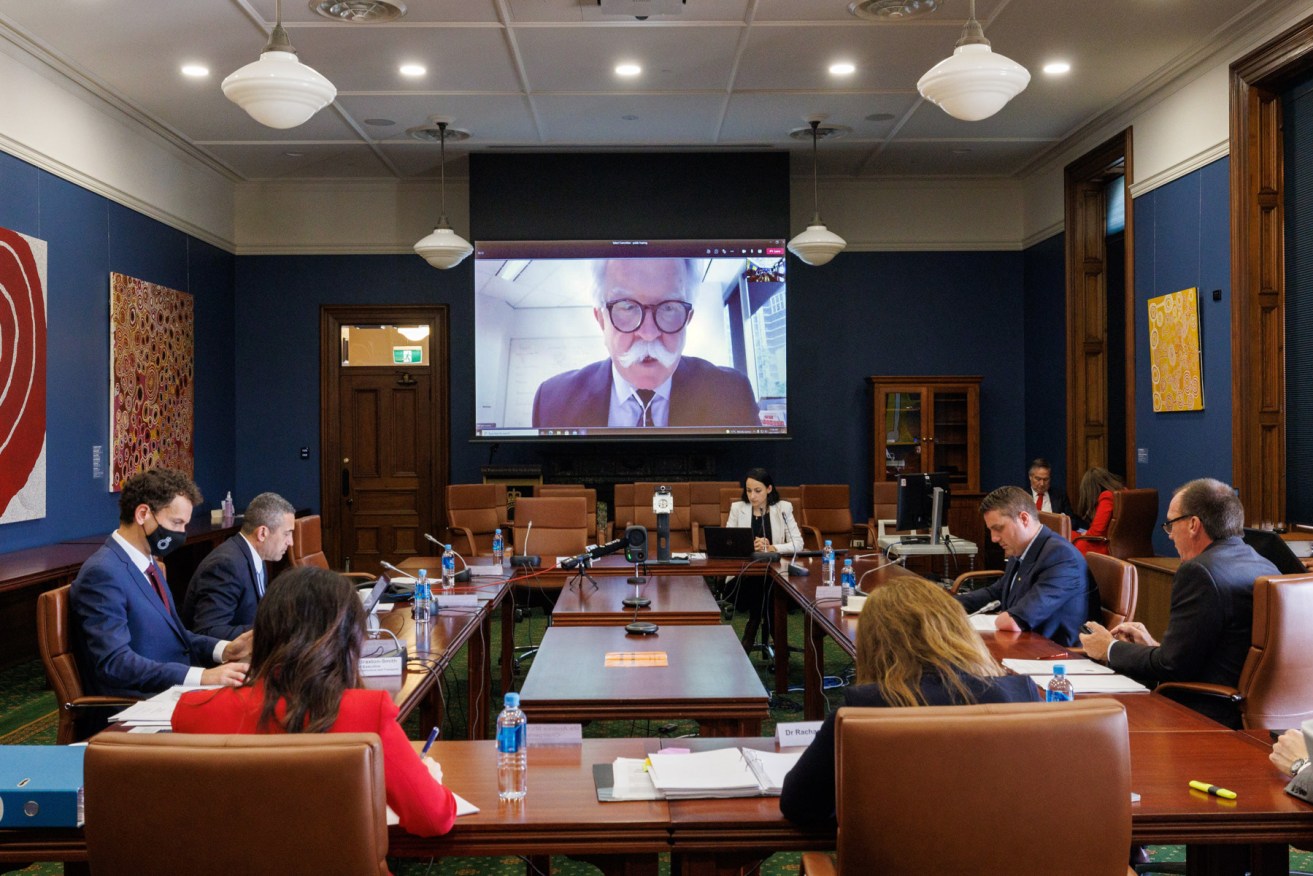Ministerial oversight needs reform, former Planning boss tells Chapman inquiry
The former head of the state’s planning commission would have recommended to Attorney-General Vickie Chapman that she had a perceived conflict of interest relating to a proposed Kangaroo Island deep-sea port and should refer the matter to cabinet – but was never asked for his advice.

Michael Lennon giving evidence via video link today. Photo: Tony Lewis/InDaily
Michael Lennon, who resigned as commission chair this year after the rollout of SA’s new planning code, today fronted a parliamentary inquiry into whether Chapman had a conflict of interest, misled parliament or breached the ministerial code of conduct relating to her veto of the $40 million proposal by Kangaroo Island Plantation Timbers.
Lennon was scathing about the processes that led to the controversial decision to veto the port, saying it was “worth questioning whether the current conditions are relevant and appropriate”.
“Major projects and their assessments and processes have never been easy for this state – these matters are always complex and finding a way in which to find balance in assessments and decision-making is enormously important,” he told parliament.
“I would certainly say having a single minister responsible for these matter raises the prospect of dispute and limitations in the way in which assessment is undertaken – it’s always better for such matters to be determined by the governor on the advice of cabinet.”
He also noted that he did not think the assessment process “was helped by the multiplicity of individuals” that had oversight at various times – with three Planning Ministers having carriage of the project over five years.
He said that was the advice he conveyed to Chapman’s predecessor Stephan Knoll, who stood aside from the Planning ministry amid the 2020 parliamentary entitlements scandal.
“As a result [of those discussions], the-then minister Stephan Knoll determined to delegate the power for the assessment report to his then chief executive,” Lennon said.
He said he had “informal discussions with senior officials about the limitations that were imposed” by the legislative regime “assigning the power and authority to a single minister”, which he had also discussed with Knoll.
He said Knoll consequently resolved that his decision would be one “canvassed with his cabinet colleagues” and “it would be a view that carried the Government as a whole”.
Asked whether Chapman had expressed a similar view, he said: “No.”
He said his professional relationship with Chapman differed to that with his predecessor, and his counsel was never sought about the decision-making processes.
If it had, he said, “I would have provided the same counsel I had given to Stephan Knoll about the complexity of these matters [and] I would have recommended this should be a matter taken to cabinet”.
He said he would similarly have advised about the “perceptions associated with her own position”.
Asked that his “recommendation would have been there was a perception of conflict”, he replied: “Yes.”
But, he added, “there’s no doubt that she had the right to make that determination for herself” and “absolutely the minister had no requirement to” seek his counsel.
“It was entirely within her discretion one way or another,” he said.
Lennon said it was widely understood that Chapman “and her family came from the island [and] had a deep history there, especially in the agricultural community on the island and continue to have strong associations there”.
“It was understood the potential for conflict, or the perception of conflict, could arise,” he said.
“It was understood that in the public perception of this that would be a reasonable matter that could be raised.”
He said department officials had made contingencies having “been advised by the minister’s office that the minister may declare a conflict and if so will appoint the Minister for Human Services [Michelle Lensink] as decision-maker” on the port matter.
“I was aware that in transmitting the [assessment] report that issues had been raised on who should be the determining minister,” he said.
“This was part of the discussions at the time as to whether a conflict or perception of conflict could arise.”
He said those discussions were between himself and Planning executive director Sally Smith, who was “relaying discussions she had held with other Government officials, including [then-Planning, Transport and Infrastructure CEO] Tony Braxton-Smith”.
However, he noted that “subsequently when the minister conveyed her views on the assessment report that had been provided, she also indicated that she had considered whether there was any potential for conflict of interest and resolved the view at that point that there was no conflict of interest and no delegation was necessary”.
Lennon said it was “obviously the responsibility of the individual to make a determination as to whether a conflict of interest arises”.
“In these circumstances the responsibility ultimately rests with the person, either alone or on advice received from relevant parties,” he said.
“Only the individual would ever know the full extent of the matters that may relate to an interest or perception of interest.”
The hearing continues, with Braxton-Smith to give evidence this afternoon.
Premier Steven Marshall has told reporters he does not intend to front the committee if asked.
Marshall was yesterday implicated in the proceedings, with ex-KIPT executive Peter Lockett revealing senior Liberals were expected to raise concerns about Chapman’s perceived conflict with the Premier.
Asked whether those discussion ever took place, Marshall told reporters today: “I don’t go into personal discussions that I have with my colleagues [but] I don’t recall those conversations, that’s for sure.”
“The reality is I’m not really that concerned about what other people think – I’m quite sure Vickie Chapman was right to make this decision,” he said.
“There’s been no bias – she’s made the right decision and I back her 100 per cent.”




